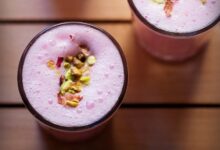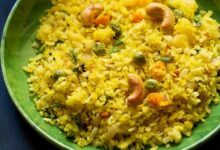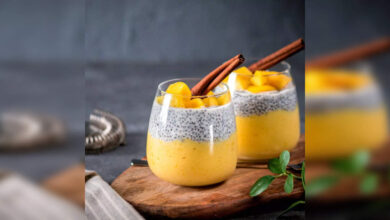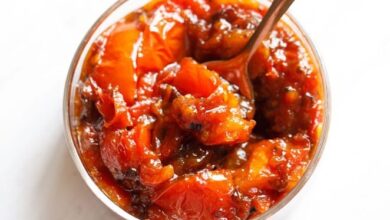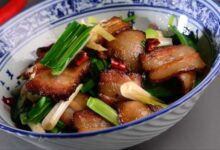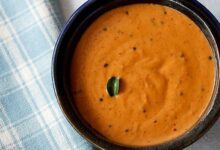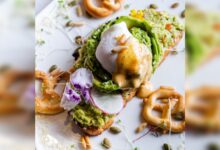Aval Payasam Recipe | Poha Kheer helobaba.com
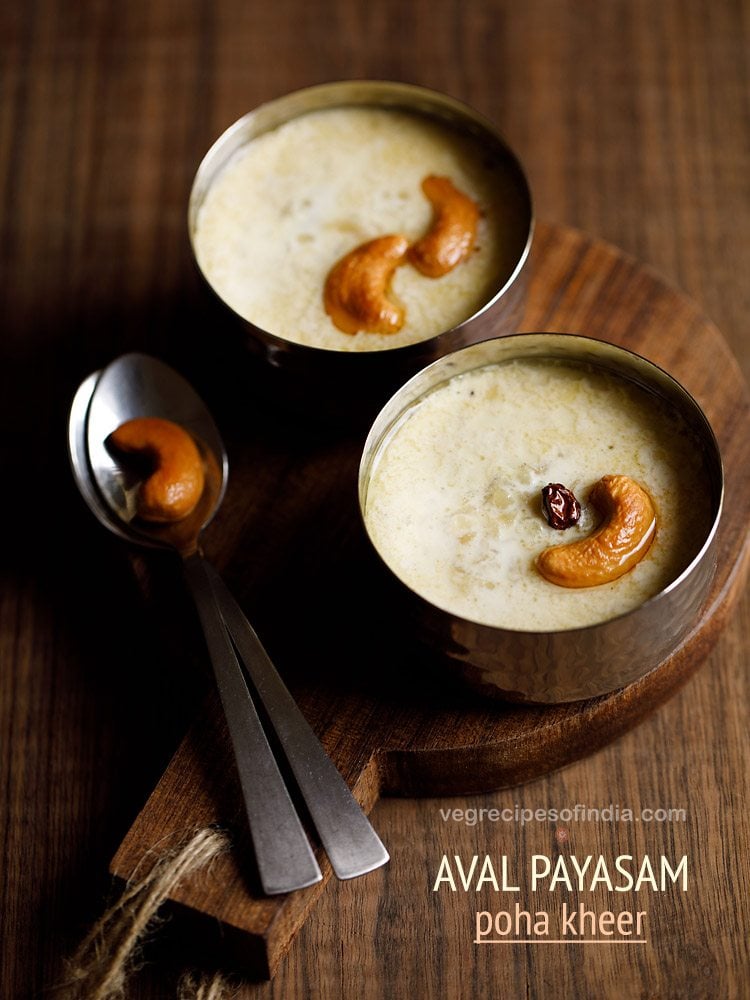
Its not just rice that is a versatile grain and can be used in a variety of ways to make the most delicious dishes, it is the forms of rice too that have the same feature. For instance, take poha or flattened rice with which this Poha Kheer is made. Known as Aval Payasam in Tamil Nadu (since poha is aval in Tamil), this is one of the easiest kheers you can make at home. Just like this Semiya Payasam, this Aval Payasam Recipe also gets done within 20 to 25 minutes. Delicious and also serves as the best kind of naivedyam for deities.


About Aval Payasam
In addition to poha and the usual kheer essentials like full-fat milk, ghee and sugar in this Aval Payasam Recipe, the other ingredients too are very, very basic. For instance, there’s some dry fruits like cashews, raisins and then flavorings like saffron and cardamom powder. Isn’t it really simple?
I usually make this Poha Kheer with the regular variety of thick white poha. But if you’re feeling fancy and have the thin or red poha handy at home, use them to make this payasam. It will turn out just as good, if not better.
This kheer is lived by kids as well. So, if you are making it for toddlers, you can skip adding the cashews and raisins in this kheer, and instead add dry fruit and nut powders. This Aval Payasam is really one of the quickest ways you can prepare a supremely divine and delicious dessert at home.
What’s even nicer is that this dish is popular in South India during Krishna Jayanthi. So, even you can make it on the occasion of Janmashtami. It is an amazing way to make the Gokul Ashtami and Dahi Handi festivities, even sweeter. If not so, then serve it hot, warm or chilled and relish it with your friends and family.
Step-by-Step Guide
How to make Aval Payasam
Frying dry fruits
1. In a heavy kadai or pan, take 2 tablespoons ghee and heat it on a low to medium flame.


2. When the ghee melts, add 10 to 12 cashews.
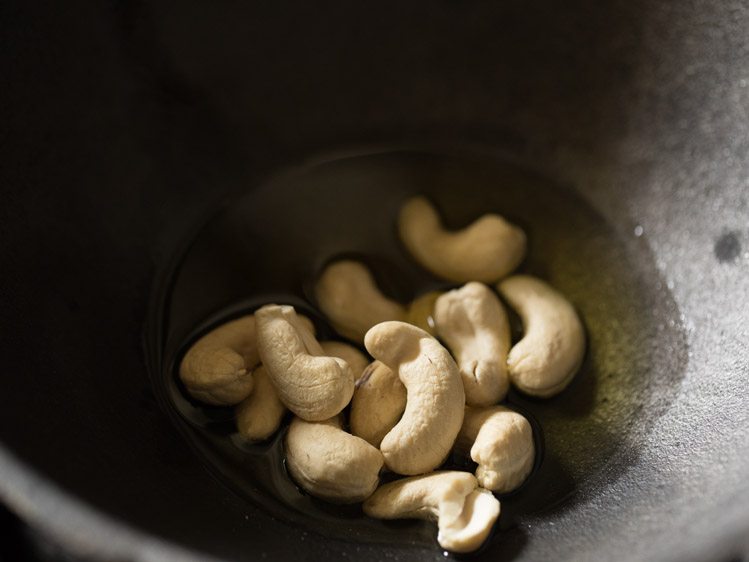

3. Begin to fry the cashews on low heat.
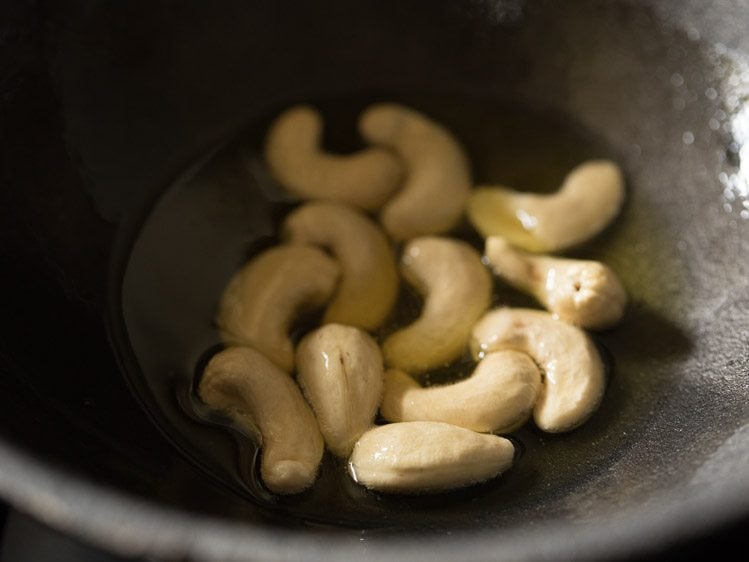

4. Fry cashews till golden. Remove with a slotted spoon and keep aside.
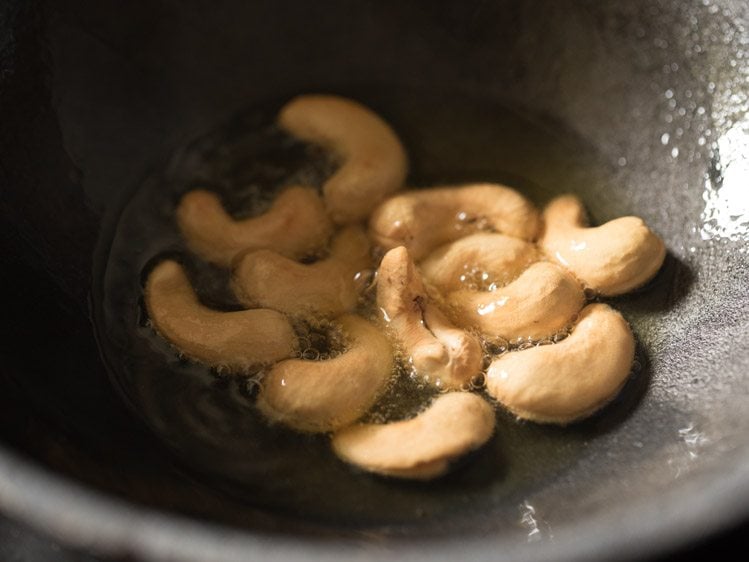

5. Then, add 1 tablespoons raisins.
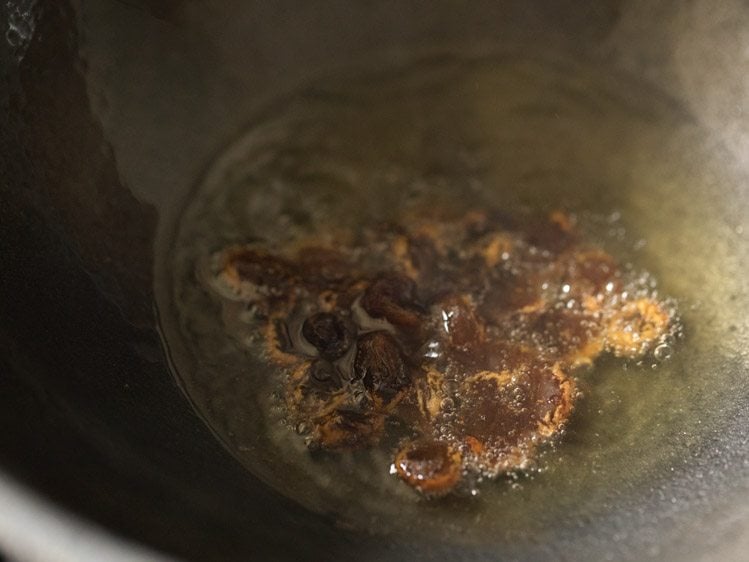

6. Stirring often, fry the raisins till they swell and become plump. Remove fried raisins with a slotted spoon and keep aside.
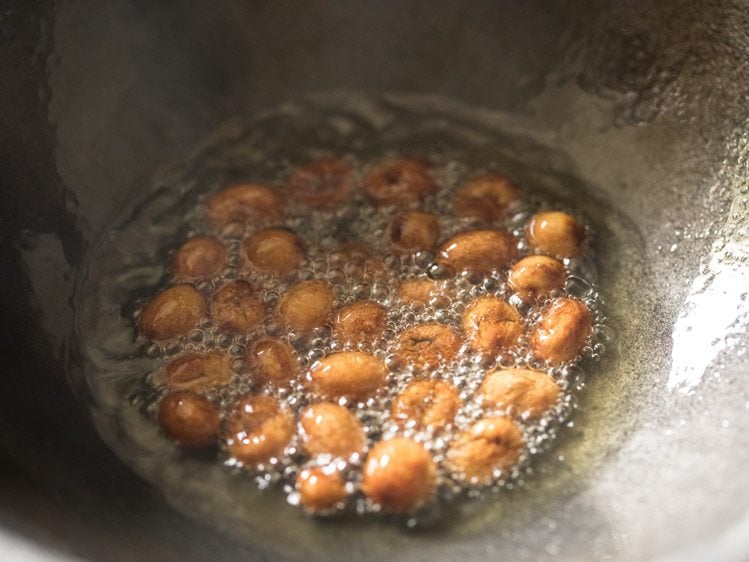

Roasting poha
7. Next, add ½ cup thick poha. You can also use thin poha.
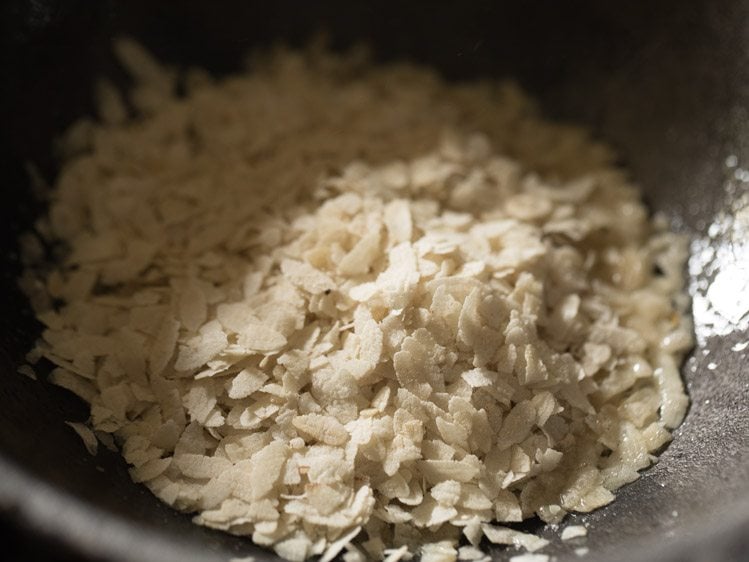

8. Mix the poha very well with the ghee.
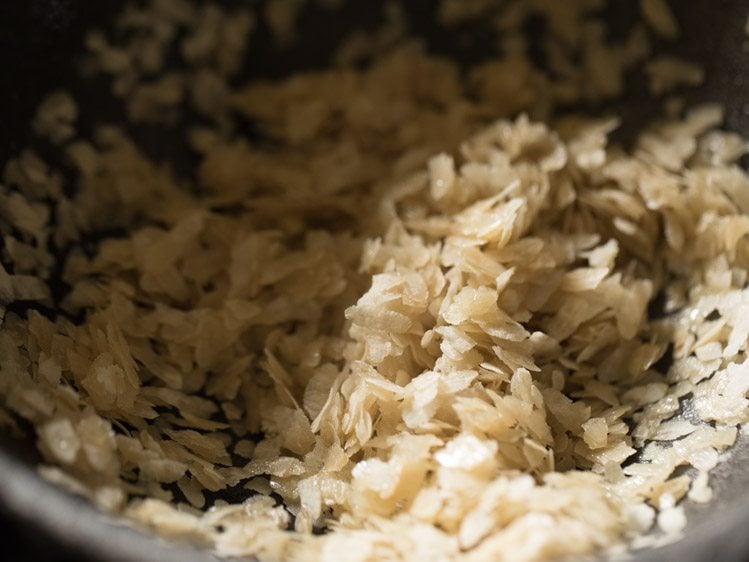

9. Begin to roast poha on low heat. Stir often.
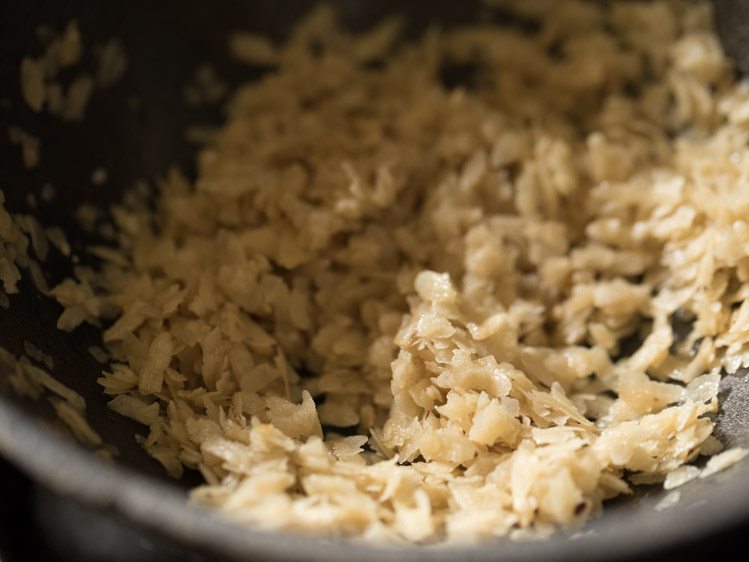

10. Roast till poha gets a light golden color. Instead of roasting poha, it can be rinsed in water and added directly to boiling milk.


Making Aval Payasam
11. Then, add 2.5 cups full fat milk. Milk can be chilled, warm, hot or at room temperature.
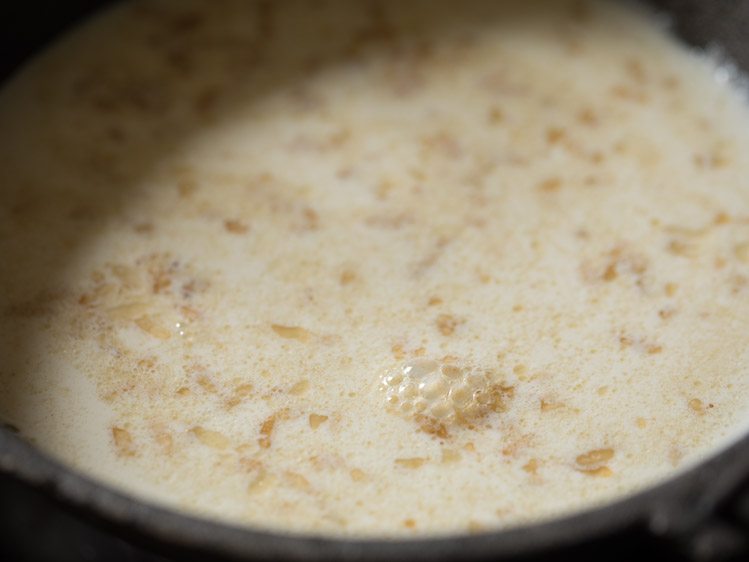

12. Next, add 1 pinch saffron strands and stir. Saffron is optional and can be skipped.
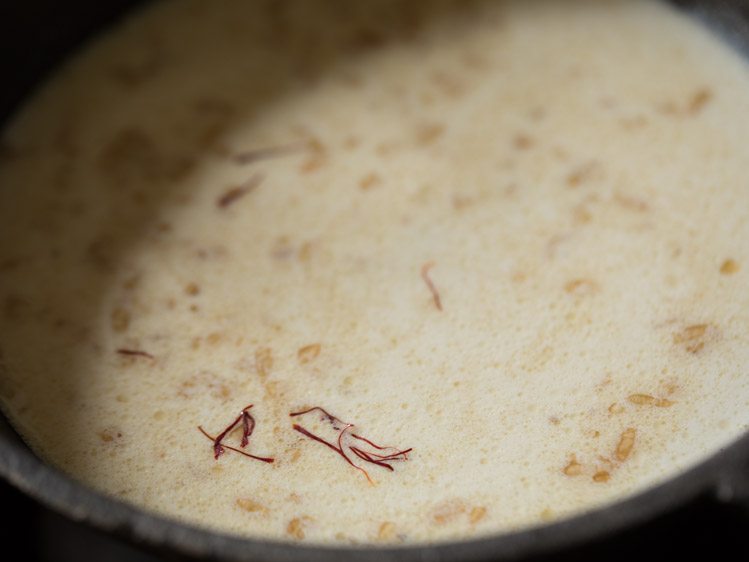

13. Keep the heat to low and bring the payasam to a boil, stirring at intervals. Let the milk boil for 2 minutes. Do keep a check and stir at intervals or else the milk can froth over and spill out.
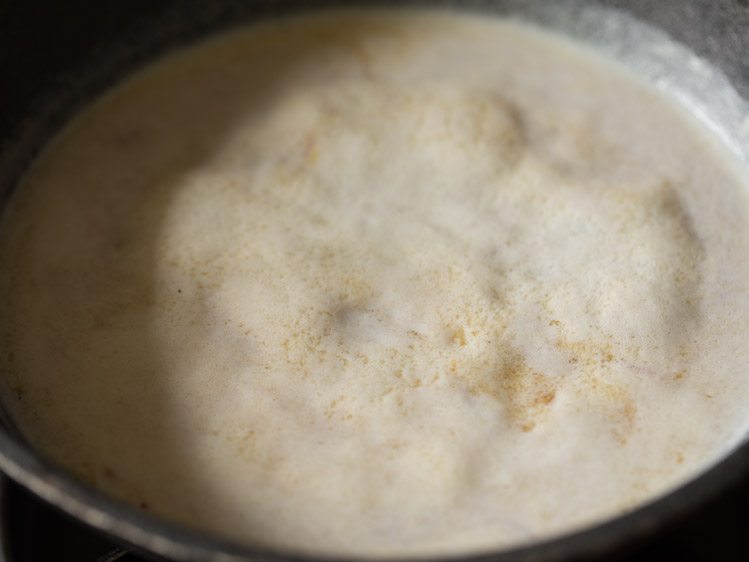

14. Then, add 4 tablespoons sugar or as required.
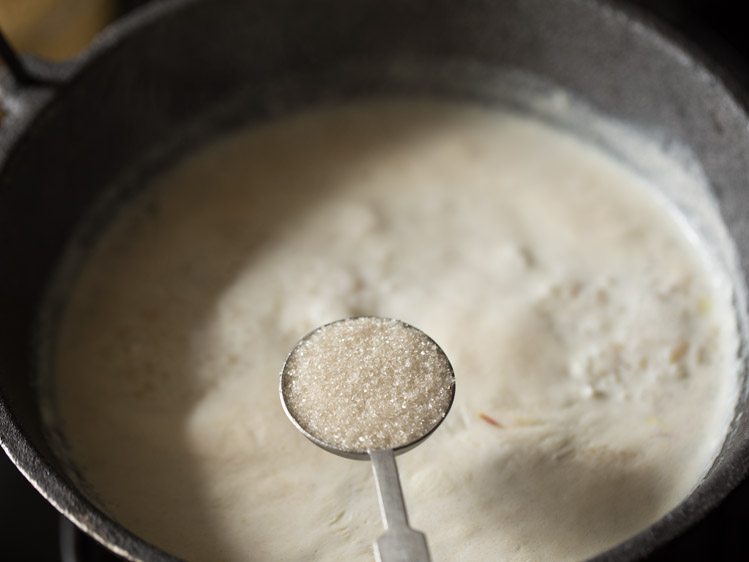

15. Next, add ⅓ teaspoon cardamom powder. You can also add ½ teaspoon cardamom powder, if you have not added saffron.
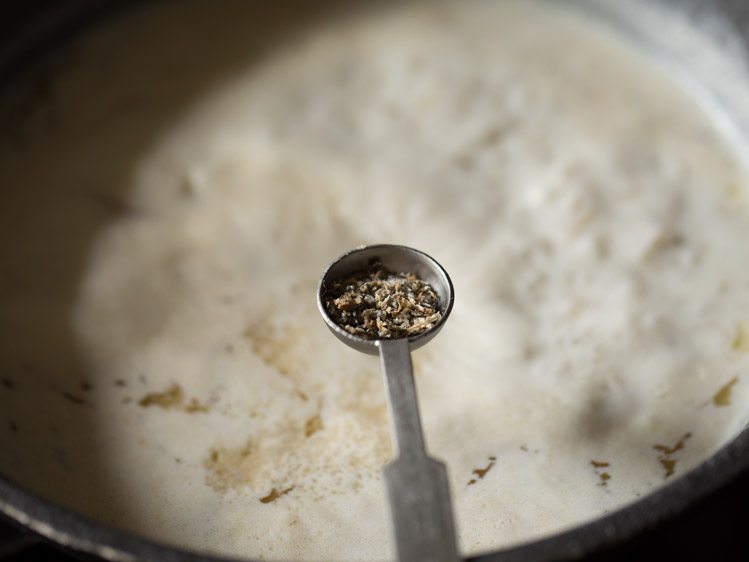

16. Mix very well so that the sugar dissolves.
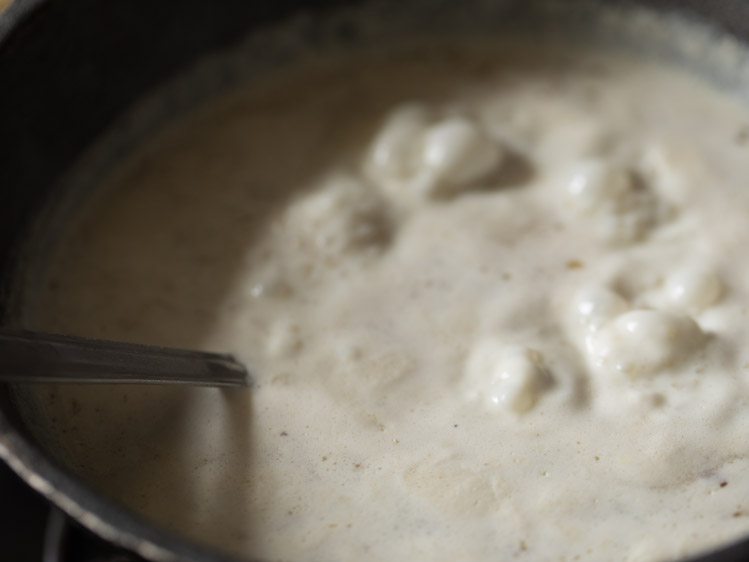

17. Continue to simmer Poha Kheer for 3 to 4 minutes more. Scrape the dried and evaporated milk solids from the sides and add to milk.
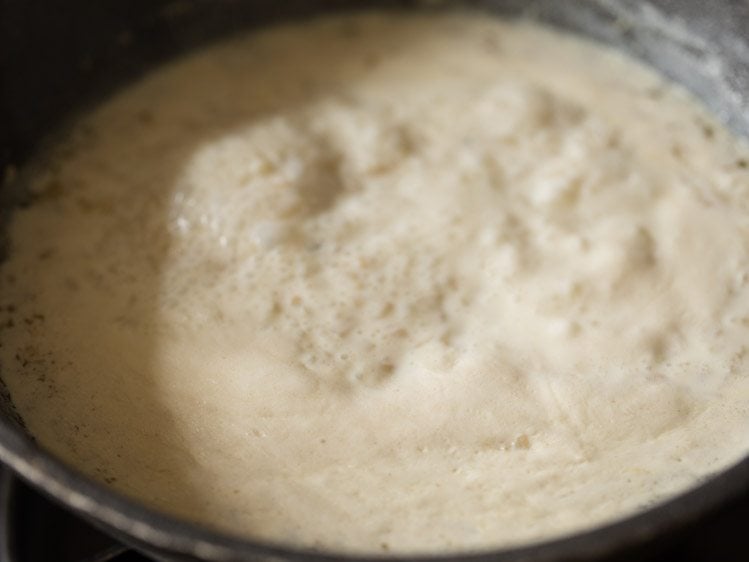

18. Switch off the heat. Add the fried cashews and raisins and mix. You can reserve a few cashews and raisins for garnish.
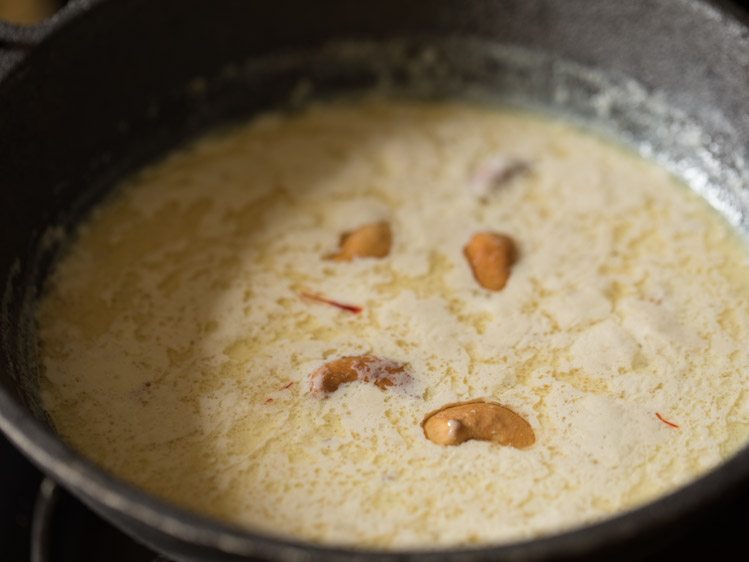

19. Serve Aval Payasam hot, warm or chilled.


More with poha
Poha (flattened, beaten or parched rice) as an ingredient in the Indian culinary field, has such a multipurpose nature, that I can literally go on and on about the importance of its usage. And why wouldn’t it be, as the way it is, it is really easy and fuss-free to cook with.
Sometimes, doesn’t even need any cooking and can be consumed with just mixing with liquids like milk/ water and sweetened with jaggery or sugar.
Just like aval, poha has many other local names like avalakki, chira, atukula, sira and pauwa to name a few. There are also many varieties available in the market that range from the regular white or the red poha to thick, thin and thinner ones.
Not just sweet or desserts like this Aval Payasam or Poha Laddu, flattened rice is also a main ingredient in many savory and snack dishes.
For instance, there are the famous South Indian Poha Idli, Aval Upma, Atukula Dosa; Maharashtra’s Chivda and Kanda Batata Poha and Madhya Pradesh’s celebrated Indori Poha. Other than this, some of the family favorite poha dishes are surely this Poha Kheer, Poha Cutlet and Chooda Matar.
Expert Tips
- Substitutes: Thin or red poha instead of regular white poha; coconut oil instead of ghee; jaggery instead of sugar.
- Saffron is optional and can be skipped. In this case, add ½ teaspoon cardamom powder instead of ⅓ teaspoon.
- If you are using jaggery in this Aval Payasam Recipe, then add it after the milk comes to a boil. Switch off heat, add jaggery and cardamom powder and mix well.
- While adding milk, it can be chilled, warm, hot or at room temperature.
- If you don’t want to roast the poha, you can rinse it in water and add directly in the boiling milk.
- While the payasam is getting cooked, keep a check. Stir at intervals as the milk can froth and spill out.
- For children and toddlers, skip adding chopped dry fruits and nuts. Instead, add powdered ones.
More Kheer Recipes To Try!
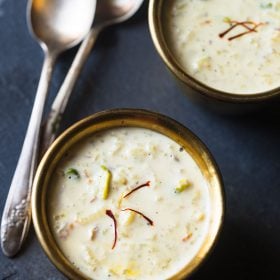

Sweets Recipes
Kheer Recipe | Rice Kheer


Sweets Recipes
Badam Kheer


Sweets Recipes
Paruppu Payasam | Moong Dal Payasam


Sweets Recipes
Oats Kheer | Oats Payasam
Please be sure to rate the recipe in the recipe card or leave a comment below if you have made it. For more vegetarian inspirations, Sign Up for my emails or follow me on Instagram, Youtube, Facebook, Pinterest or Twitter.


Aval Payasam
Delicious poha kheer or payasam made with flattened rice, ghee and milk.
Prep Time 5 minutes
Cook Time 15 minutes
Total Time 20 minutes
Prevent your screen from going dark while making the recipe
frying dry fruits
In a heavy kadai or pan, take 2 tablespoons ghee and heat it on a low to medium flame.
When the ghee melts, add 10 to 12 cashews.
Begin to fry the cashews on a low flame till they become golden.
Remove with a slotted spoon and keep them aside.
Then add 1 tablespoons raisins.
Stirring often fry the raisins, till they swell and become plump. Remove fried raisins with a slotted spoon and keep them aside.
making aval payasam
Then add 2.5 cups full fat milk. Milk can be chilled, warm, hot or at room temperature.
Next add 1 pinch saffron strands. Saffron is optional and can be skipped. Stir.
Keep the flame to a low and bring the payasam mixture to a boil stirring at intervals. Let the milk boil for 2 minutes. Do keep a check and stir at intervals or else the milk can froth over and spill out.
Then add 4 tablespoons sugar or add as required.
Next add ⅓ teaspoon cardamom powder. You can also add ½ teaspoon cardamom powder if you have not added saffron.
Mix very well so that the sugar dissolves.
Continue to simmer for 3 to 4 minutes more. Scrape the dried and evaporated milk solids from the sides and add to milk.
Switch off the flame. Lastly add the fried cashews and raisins and mix. You can reserve a few cashews and raisins for garnish.
Serve aval payasam hot or warm or chilled.
- Coconut oil can be used instead of ghee.
- Thin poha can be used instead of thick poha.
- Jaggery can be added instead of sugar. If adding jaggery, then add after the milk comes to a boil. Switch off the flame and add jaggery & cardamom powder. Mix very well.
Nutrition Facts
Aval Payasam
Amount Per Serving
Calories 417 Calories from Fat 162
% Daily Value*
Fat 18g28%
Saturated Fat 10g63%
Polyunsaturated Fat 1g
Monounsaturated Fat 2g
Cholesterol 42mg14%
Sodium 90mg4%
Potassium 375mg11%
Carbohydrates 56g19%
Fiber 1g4%
Sugar 30g33%
Protein 10g20%
Vitamin A 335IU7%
Vitamin B1 (Thiamine) 1mg67%
Vitamin B2 (Riboflavin) 1mg59%
Vitamin B3 (Niacin) 1mg5%
Vitamin B6 1mg50%
Vitamin B12 1µg17%
Vitamin C 1mg1%
Vitamin D 3µg20%
Vitamin E 1mg7%
Vitamin K 2µg2%
Calcium 238mg24%
Vitamin B9 (Folate) 13µg3%
Iron 1mg6%
Magnesium 44mg11%
Phosphorus 242mg24%
Zinc 1mg7%
* Percent Daily Values are based on a 2000 calorie diet.
This Aval Payasam Recipe from the archives was first published in April 2017. It has been updated and republished in March 2024.

